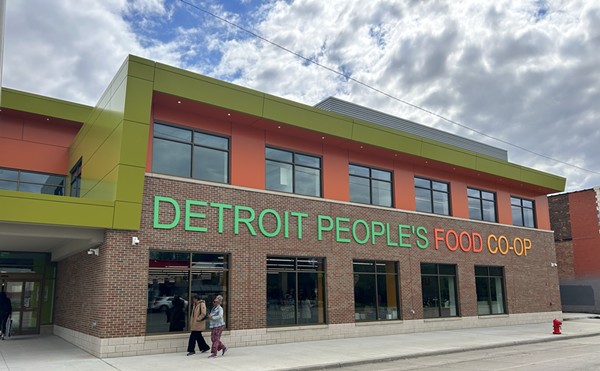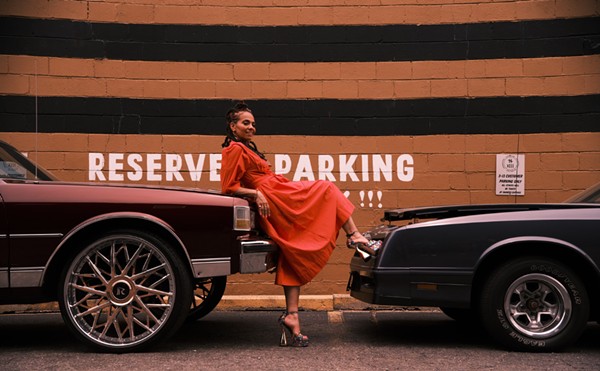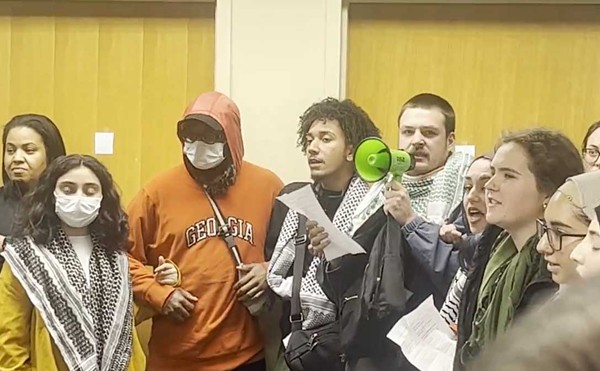George W. Bush will go down as the worst environmental president in our nation’s history … generations of Americans will pay with reduced prosperity and quality of life. —Robert Kennedy Jr., Crimes Against Nature
If we don’t save the environment, in the end, nothing else will matter. That’s something everyone knows to be true, and which most journalists, including me, don’t spend nearly enough time looking into or writing about.
Environmental reporting, after all, involves science and takes hard work and sometimes money, and seldom captures public attention as easily as rumors, say, that the mayor is sexually harassing his secretary.
Locally, Detroit has so many glaring problems and appallingly interesting personalities that it’s easy to overlook the brownfields, the sites so polluted that nobody will ever put anything there because the cost of cleaning them up is so high. It’s easy not to ask about the true condition of the Detroit River, or our other waterways, or the lingering effects of a century of industrial excess.
And while pollution may — in the not-very-long run — do us all in, when it comes to the evening news, it doesn’t have nearly the ratings appeal of a double murder or a pervert caught in the park. If either side made the environment an issue in the last presidential campaign, I must have blinked and missed it.
Robert Kennedy Jr. knows how wrong that is. He has spent years fighting — more or less quietly — for the environment, mainly in upstate New York, where he lives; prosecuting governments and companies for polluting the water; and getting heavily involved in the Riverkeepers, an alliance of those who seek to be sort of environmental shepherds of our waterways.
This summer, he wrote a short but devastatingly powerful book, Crimes Against Nature (HarperCollins, $21.95), about the environmental record of this administration. Kennedy is, yes, the son of the Robert Kennedy who in 1968 ran for president in a desperate attempt to end divisions in America, and to persuade his country to end a hopeless occupation and war.
There are still those who believe things might be different in this nation today if history hadn’t been changed by a loser with a gun in a hotel kitchen. RFK’s namesake is now eight years older than his dad was when he died; the men have an uncanny resemblance, though the son is considerably taller.
For most of his life, he’s been dedicated mostly to the environment, trying to be as nonpartisan as possible. “The environment is not a Democratic or Republican issue,” he said when I heard him speak a few years ago.
This book is different. This is, clearly, not just an intellectual issue for him. Recently Kennedy had himself tested; his own PCBs are so high, he said, that if he were a pregnant woman, the fetus would be certain to have mental impairment. Several of his six children have asthma. He remembers watching a subspecies of falcon in Washington as a boy, when his uncle was in the White House, a bird that’s now extinct, courtesy of DDT.
And RFK Jr. firmly and passionately believes George W. Bush is destroying this country by turning the environment over to people for whom maximizing corporate profits is the only real value, and he wrote this book at least partly in an effort to help prevent America from re-electing him.
Originally, Kennedy was supposed to come talk about his book and the environment at Michigan State University’s law school in October, but his friend Christopher Reeve died, and he had to give a eulogy. So he came last week, when hopes for something better coming out of the election had turned to dust.
Actually, I thought what he might say would be more interesting now. What, I wondered, did he think environmentalists should do? “Back to the barricades,” he quipped. But to my surprise, when I talked to him on the phone, he talked more about the political environment — and the journalistic one.
“This is really a fight to preserve democracy,” he told me. But rather than talking about campaign finance, he said the most important reform is “to bring back the fairness doctrine that regulates our [broadcast] media.”
He meant to say, used to regulate. Nobody owns the airwaves — they’re public property — and stations operate under terms of a license from the Federal Communications Commission. For many years the government required that, to keep their licenses, they needed to keep the public informed, and provide equal time to explain both sides of major issues of the day.
That ended under Ronald Reagan, whose FCC chairman called television “just another appliance — a toaster with pictures.” The theory was that with all the new diverse channels, all points of view would be represented anyway.
Right. The FCC also had strict rules to make sure that no one company could own too many media outlets, especially in the same town. That ended under Bill Clinton; seven media giants now control virtually all the airwaves.
We have a climate today where news outlets are afraid to investigate or even piss off their corporate masters.
Kennedy’s slight book is full of horror stories about environmental plunder, yes, but also about anchors like CNN’s Aaron Brown, who refused to have him on to talk about his book because he didn’t want any “Bush-bashing.” (He showed another report on Michael Jackson instead.)
He concludes, interestingly, that the reason Bush was re-elected is not mainly because we’re a nation of fundamentalist greedheads. In large part, it’s because the media is failing to do its job. “It’s not such an ideological difference between the blue states and the red states, it is an information deficit. People who supported Bush are getting their information from a propaganda machine.
“There’s a recent report from the University of Maryland that shows that 72 percent of people who voted for Bush believe that Saddam Hussein bombed the World Trade Center, and 75 percent believe that weapons of mass destruction were found. And they believe President Bush is taking care of the environment.”
I heard the exasperation in his voice. “Eighty percent of Republicans are Democrats, I think, who just don’t know what is going on. They don’t know they are voting for people who are working against the economic interests of those who support them.”
Later last week I drove to see him speak in East Lansing, to a very large crowd. He spoke for more than an hour, and I saw no one’s attention waver.
Toward the end, he mentioned that in conceding, John Kerry had said that it was now time for all Americans to come together. Then Kennedy said something startling. “I don’t think this is the time to do that. These people are destroying our country. If we don’t do everything we can to stop them and to defeat them, then there is something wrong with our generation.”
Earlier I had asked him if he ever thought he might do what he’s always resisted, and run for office. “I’ve been struggling to avoid doing that my entire life. And I don’t know what I’m going to do now. But if there is a way for me to continue being effective without running for politics, I’d do that.”
I thought of another man with the same name as this one, who had also struggled to avoid running for president at another period when this nation was being destroyed, back when this Kennedy and I were in our early teens.
I thought of the leadership and the truth-tellers that we lack, and how hungry so many are for somebody to inspire and lead them.
And I thought that Robert F. Kennedy Jr. should think some more.
Jack Lessenberry opines weekly for Metro Times. Send comments to [email protected]




